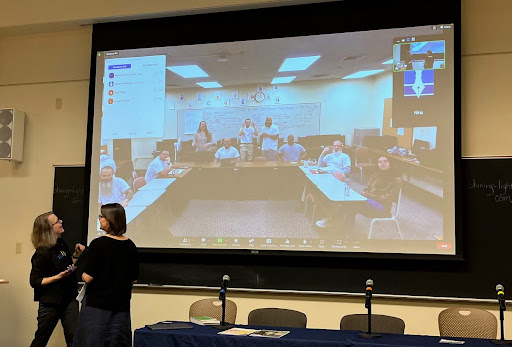
On Monday, Nov. 13, the Phi Eta Sigma Honor Society hosted a productivity workshop led by Dr. Robert Brill, associate professor of psychology, who specializes in industrial and organizational psychology.
The workshop’s goal was to provide students with time management strategies that can be implemented as finals season approaches. Brill began by discussing the symptoms of burnout, which include emotional exhaustion, a loss of interest in hobbies and goals, and a disconnect from friends and family.
Other symptoms of stress and burnout can include increased irritability and illness, excess physical exhaustion, and anxiety or depression.
Brill gave students attending the workshop a chart to identify the emotional, cognitive, behavioral, and physical symptoms they experience when stressed.

After allowing students to consider the symptoms they personally experience as well as discussing symptoms not listed on this chart, Brill shared that to prevent these symptoms, it is important to implement time management strategies.
“Time management is our most critical commodity. We should cherish it more than we do, but that’s hard to do unless we are deliberate,” he said.
Brill gave each student a paper with a weekly schedule, time blocked by an hour. He asked each student to complete this schedule beginning with their courses, work schedule, and extracurricular commitments.
He then asked students to schedule commitments to themselves which consisted of commute times, sleep schedules, meal times, hygiene, and relaxation/leisure time. After completing this, students shared that this part of their schedule was more difficult to complete as these tasks are often completed inconsistently.
With these insights, Brill shared that these are often the tasks that students sacrifice in order to complete school and work obligations. He also spoke about the sleep debt that many students, and Americans in general, are facing.
Sleep debt occurs when someone does not sleep enough, at the correct time, or gets poor quality sleep. Centers for Disease Control and Prevention has stated that 1 in 3 adults in the U.S. experience sleep debt.
Sleep debt has many consequences such as mental and physical health problems, and a loss of productivity. Sleep debt can also interfere with tasks such as schoolwork, driving, socialization, focusing, and reaction time. Lack of sleep can also lead to negative emotions and increased anxiety or depression.
Therefore, Brill stressed that it is important for students to be mindful of sleep and other self-care tasks and to schedule them into their daily routines in order to be best prepared for their academic and professional obligations.
Next, Brill asked students to write into their schedule times in which they study. Brill shared that any blocks of studying that are longer than 4 hours can become unproductive as students lose concentration and motivation. Work after the third or fourth hour can become counterproductive and cause fatigue.
“Students receive diminishing returns in the third or fourth hour of studying,” he said, “It’s most likely that you are wasting time if you are not fully alert.”
Shorter, more meaningful, blocks of studying yield better
results. Rhodes College claims that 40-60-minute blocks of studying multiple times a day are more realistic and productive than studying for a longer period of time.
Brill advised students to label study time for each course and spread out time spent on each course to maintain focus. He also shared that sleep is important in retaining the information learned during study sessions and should be a priority.
To stay accountable with these study routines, Brill suggested having an accountability partner. Sharing your goals and holding each other accountable can provide extra motivation. He also suggested having SMART goals, both short and long-term. These goals are specific, measurable, achievable, relevant, and time-based.
Brill also recommended creating task lists and taking inventory of small wins.
“Bask in small wins,” Brill said, “Oftentimes, we are comatose and procrastinating because we are overwhelmed. If you do one small thing, an avalanche will start and you will continue to get more done.”
Creating a list of each stage of a larger project can help make that project appear more manageable. By crossing off each small task completed, you are more motivated to continue.
Brill shared the demand-control- support model which illustrates the demands of work or school, the amount of control an individual has over these demands, and the support individuals receive from peers, bosses, professors, etc. Based on this model, Brill challenged each student at the workshop to reduce demand by eliminating two tasks from their schedule for the rest of the semester.
All of the strategies Brill referred to during the workshop can be implemented by any student to decrease stress during finals season and beyond.







